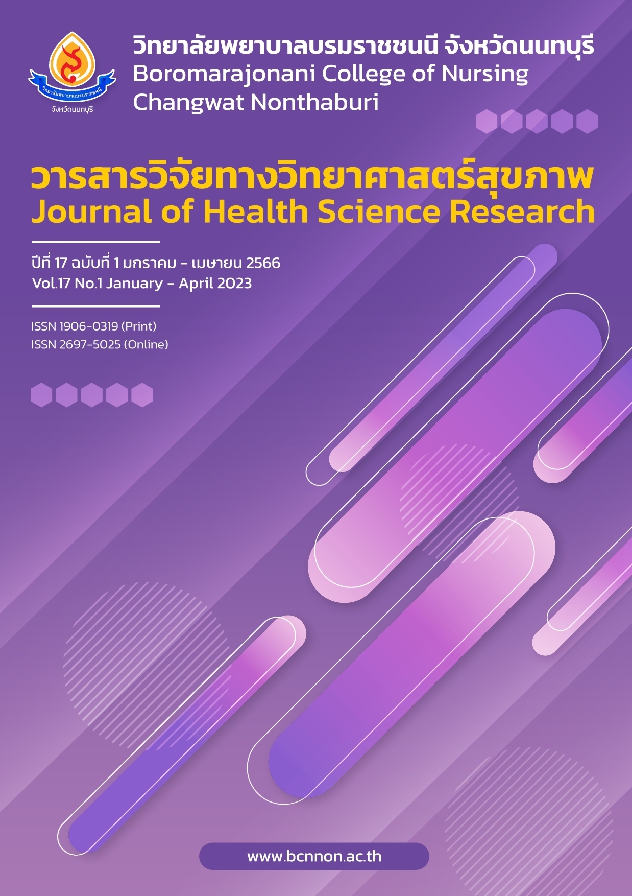ปัจจัยที่มีผลต่อการเกิดภาวะน้ำตาลในเลือดต่ำในผู้ป่วยเบาหวานชนิดที่ 2 ที่เข้ารับบริการแผนกผู้ป่วยนอกโรคเบาหวาน
Main Article Content
บทคัดย่อ
บทนำ : ภาวะน้ำตาลในเลือดต่ำเป็นภาวะแทรกซ้อนเร่งด่วนที่คุกคามชีวิตและเป็นอุปสรรคต่อการควบคุมระดับน้ำตาลในเลือดในผู้ป่วยเบาหวาน
วัตถุประสงค์การวิจัย : เพื่อศึกษาปัจจัยที่มีผลต่อการเกิดภาวะน้ำตาลในเลือดต่ำในผู้ป่วยเบาหวานชนิดที่ 2 ที่เข้ารับบริการในแผนกผู้ป่วยนอกโรคเบาหวาน
วิธีการวิจัย : การศึกษาย้อนหลังเชิงพรรณนา 3 ปี จากเวชระเบียนของผู้ป่วยเบาหวานชนิดที่ 2 ที่มีค่าระดับน้ำตาลในเลือดต่ำ จำนวน 100 คน กำหนดสัดส่วนของตัวอย่างเท่ากับ 1 : 2 ได้ตัวอย่างที่ไม่มีภาวะน้ำตาลในเลือดต่ำเป็นกลุ่มเปรียบเทียบ จำนวน 200 คน เครื่องมือที่ใช้ในการวิจัยประกอบด้วยแบบบันทึกข้อมูลส่วนบุคคล การเจ็บป่วย และการรักษา วิเคราะห์ข้อมูลโดยใช้สถิตค่าที ไคสแควร์ และ การถดถอยโลจิสติกพหุนาม
ผลการวิจัย : พบว่าระยะเวลาของการเป็นโรค (> 5 ปี, OR 2.28, [95% CI 1.12 - 4.63]), ดัชนีมวลกาย (< 18.5 กก./ม2, OR 0.18, [95%CI 0.07 - 0.45]), eGFR (< 60 ml/min/1.73m2, OR 4.04, [95%CI 2.08 - 7.87]),ยารักษาเบาหวานชนิดรับประทานที่ได้รับ (> 1 ชนิด, OR 2.47, [95% CI 1.31 - 4.67]),
การได้รับยารักษาโรคความดันโลหิตสูง (ได้รับยา, OR 2.75, [95% CI 1.44 - 5.23]) มีผลต่อการเกิดภาวะน้ำตาลในเลือดต่ำในผู้ป่วยเบาหวานชนิดที่ 2 อย่างมีนัยสำคัญที่ p <.05
สรุปผล : ปัจจัยที่มีผลต่อการเกิดภาวะน้ำตาลในเลือดต่ำในผู้ป่วยเบาหวานชนิดที่ 2 คือ ระยะเวลา ของการเป็นโรค ดัชนีมวลกาย อัตราการกรองของไตจำนวนยารักษาเบาหวานชนิดรับประทานที่ได้รับ และการได้รับยารักษาโรคความดันโลหิตสูง
Downloads
Article Details

อนุญาตภายใต้เงื่อนไข Creative Commons Attribution-NonCommercial-NoDerivatives 4.0 International License.
บทความที่ได้รับการตีพิมพ์เป็นลิขสิทธิ์ของวิทยาลัยพยาบาลบรมราชชนนี จังหวัดนนทบุรี
ข้อความที่ปรากฏในบทความแต่ละเรื่องในวารสารวิชาการเล่มนี้เป็นความคิดเห็นส่วนตัวของผู้เขียนแต่ละท่านไม่เกี่ยวข้องกับวิทยาลัยพยาบาลบรมราชชนนี จังหวัดนนทบุรี และคณาจารย์ท่านอื่น ในวิทยาลัยฯ แต่อย่างใด ความรับผิดชอบองค์ประกอบทั้งหมดของบทความแต่ละเรื่องเป็นของผู้เขียนแต่ละท่าน หากมีความผิดพลาดใด ๆ ผู้เขียนแต่ละท่านจะรับผิดชอบบทความของตนเองแต่ผู้เดียว
เอกสารอ้างอิง
Lankrew Ayalew T, Gelaw Wale B, Tefera Zewudie B. Hypoglycemia prevention practice and associated factors among diabetes mellitus patients in Ethiopia: Systematic review and meta-analyssis. PloS one. 2022;17(11):e0275786. doi: 10.1371/journal.pone.0275786.
ElSayed NA, Aleppo G, Aroda VR, et al. 6. glycemic targets: Standards of care in diabetes-2023. Diabetes Care. 2022; 46(Suppl 1):S97-110. doi: 10.2337/dc23-S006.
brahim M, Baker J, Cahn A, et al. Hypoglycaemia and its management in primary care setting. Diabetes Metab Res Rev. 2020;36(8):e3332. doi: 10.1002/dmrr.3332.
Edridge CL, Dunkley AJ, Bodicoat DH, et al. Prevalence and incidence of hypoglycaemia in 532,542 people with type 2 diabetes on oral therapies and insulin: A systematic review and meta-analysis of population based studies. PLOS ONE. 2015;10(6): e0126427. doi: 10.1371/journal.pone.012642 7.
Satirapoj B, Pratipanawatr T, Ongphiphadhanakul B, et al. Real-world evaluation of glycemic control and hypoglycemic Events among type 2 diabetes mellitus study (REEDS): a multicentre, cross-sectional study in Thailand. BMJ Open. 2020;10(2) :e031612. doi: 10.1136/bmjopen-2019-031612.
Kaewput W, Thongprayoon C, Varothai N, et al. Prevalence and associated factors of hospitalization for dysglycemia among elderly type 2 diabetes patients: A nationwide study. World J Diabetes. 2019; 10(3):212-23. doi: 10.4239/wjd.v10.i3.212.
Pongplanchai N, Ammatatrakul N, Banjerdsin N, et al. Risk factors of severe hypoglycemia in type 2 diabetic patients at District Hospital, Wiang Pa Pao Chiang Rai, Thailand. Greater Mekong Sub-region Medical Journal. 2022;2(2):101-8. (in Thai).
Strizek A, Chang C-J, Furnback W, et al. The cost of hypoglycemia associated with type 2 diabetes mellitus in Taiwan. Value Health Reg Issues. 2019;18:84-90. doi: 10.1016/j.vhri.2019.01.002.
Freeland B. Hypoglycemia in Diabetes Mellitus. Home Healthc Now. 2017;35(8): 414-9. doi: 10.1097/nhh.0000000000000584.
Silbert R, Salcido-Montenegro A, Rodriguez-Gutierrez R, et al. Hypoglycemia among patients with type 2 diabetes: epidemiology, risk factors, and prevention strategies. Curr Diab Rep. 2018;18(8):53. doi: 10.1007/s11892-018-1018-0.
Durán-Nah JJ, Rodríguez-Morales A, Smitheram J, et al. Risk factors associated with symptomatic hypoglycemia in type 2 diabetes mellitus patients. Rev Invest Clin. 2008;60(6):451-8.
Akirov A, Amitai O, Masri-Iraqi H, et al. Predictors of hypoglycemia in hospitalized patients with diabetes mellitus. Intern Emerg Med. 2018;13(3):343-50. doi: 10. 1007/s11739-018-1787-0.
Cruz P. Inpatient hypoglycemia: The challenge remains. J Diabetes Sci Technol. 2020;14(3): 560-6. doi: 10.1177/1932296820918540.
Alwafi H, Alsharif AA, Wei L, et al. Incidence and prevalence of hypoglycaemia in type 1 and type 2 diabetes individuals: A systematic review and meta-analysis. Diabetes Res Clin Pract. 2020;170:108522. doi: 10.1016/j.diabres.2020.108522.
Crabtree T, Ogendo J-J, Vinogradova Y, et al. Intensive glycemic control and macrovascular, microvascular, hypoglycemia complications and mortality in older (age ≥60years) or frail adults with type 2 diabetes: a systematic review and meta-analysis from randomized controlled trial and observation studies. Expert Rev Endocrinol Metab. 2022;17(3):255-67. doi: 10.1080/17446651.2022.2079495.
Cheng PC, Hsu SR, Tu ST, et al. Body mass index influences the plasma glucose concentration during iatrogenic hypoglycemia in people with type 2 diabetes mellitus: a cross-sectional study. PeerJ. 2018;6: e4348. doi: 10.7717/peerj.4348.
Winnick JJ, Kraft G, Gregory JM, et al. Hepatic glycogen can regulate hypoglycemic counterregulation via a liver-brain axis. J Clin Invest. 2016;126(6):2236-48. doi: 10. 1172/jci79895.
Cahn A, Raz I, Mosenzon O, et al. Predisposing factors for any and major hypoglycemia with saxagliptin versus placebo and overall: Analysis from the SAVOR-TIMI 53 Trial. Diabetes Care 2016;39(8):1329-37. doi: 10.2337/dc15-2763.
ElSayed NA, Aleppo G, Aroda VR, et al. 9. Pharmacologic approaches to glycemic treatment: standards of care in diabetes-2023. Diabetes Care. 2022;46(Suppl 1): S140-57. doi: 10.2337/dc23-S009.
Elshimy G, Techathaveewat P, Alsayed M, et al. Simple reason for hypoglycemia: ACE inhibitor-induced severe recurrent hypoglycemia in a nondiabetic patient. Cureus. 2019;11(8):e5449. doi: 10.7759/ cureus.5449.
Brackney DE. Hypoglycemia: An unwelcome companion to effective diabetes management Am Nurse Today. 2018;13(8):6-13.


